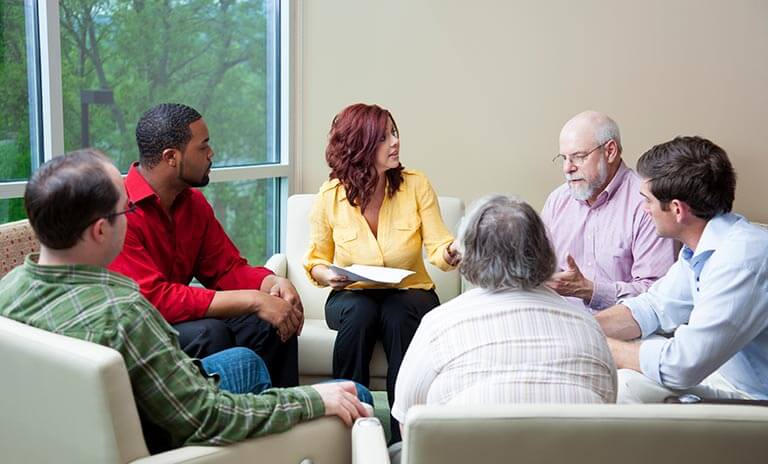Learn how to recognize the signs and symptoms of posttraumatic stress disorder and get help for yourself or a loved one. Seven Hills Hospital helps individuals struggling with posttraumatic stress disorder build a strong foundation for lasting recovery. Located near Las Vegas, Seven Hills is the leading provider of psychiatric and addiction treatment.
Understanding PTSD
Learn About Post Traumatic Stress Disorder
Posttraumatic stress disorder (PTSD) is a mental illness that develops as the result of experiencing or witnessing a traumatic event that causes the individual to develop extreme emotional distress. Some of these traumatic events can include motor vehicle accidents, exposure to war, natural disasters, or the loss of a close loved one. When an individual is struggling with PTSD, he or she will continue to feel stress and fear even after the danger has passed. The symptoms associated with this disorder can become so debilitating that an individual is unable to function on a daily basis. Individuals with PTSD often begin to experience vivid flashbacks of the event, feel a heightened sense of awareness, and feel like they are in a constant state of danger.
While any situation that causes someone to feel helpless or victimized can lead to posttraumatic stress disorder, some of the most common events that can cause severe distress include:
- Rape, sexual assault, or physical and/or emotional abuse
- Plane crashes or car accidents
- Terrorist attacks
- Natural disasters
- Kidnapping
- War
- Sudden, unexpected death of a loved one
Statistics
Statistics on PTSD
It is said that every year approximately 5.2 million adults will suffer from posttraumatic stress disorder. It is believed to be more common in women, with an estimated 10% of women developing PTSD at some point in their lives in comparison to only 5% of men. However, it is possible that this statistic is not accurate due to the fact that men may not report the presence of PTSD symptoms as frequently as women do.
Causes & Risks
Causes and Risk Factors of PTSD
The main thing that triggers symptoms of PTSD is experiencing or witnessing an event involving actual or threatened death or serious injury. However, researchers are not sure why some individuals will develop PTSD while others do not. There is a variety of different factors that can play a role in determining whether or not a person will suffer from posttraumatic stress disorder following a traumatic event. Some examples of the various causes and risk factors include:
Genetic: There is believed to be a genetic link to why some people will develop PTSD following a traumatic event while others do not. Research has indicated that individuals who have a first-degree relative who suffers from anxiety disorders or other types of mental illnesses are a greater risk for developing PTSD than individuals without a similar family history. Additionally, some research has shown that inherited aspects of one personality, or temperament, can lead to the development of this disorder.
Physical: Certain neuroimaging studies have shown that people who are suffering from PTSD have noticeable differences in the structure of certain parts of their brain. In addition, the levels of dopamine and serotonin tend to be lower in individuals who experience anxiety. This means that the way in which an individual’s brain regulates the chemicals and hormones that are released by the body in response to stress can impact whether or not an individual develops PTSD.
Environmental: Life experiences can have a large impact on the development of PTSD. Those whose lives tend to be overwhelmed by highly stressful situations are at an increased risk of developing PTSD. Things such as witnessing violence on a regular basis or growing up in an environment where one is subjected to repeated abuse can result in the onset of posttraumatic stress disorder later in life.
Risk Factors:
- Being female
- Experiencing intense and long-lasting trauma
- Lacking a strong support system
- Lacking coping skills
- Suffering from physical, emotional, and/or sexual abuse as a child
- Suffering from other mental health problems
Signs & Symptoms
Signs and Symptoms of PTSD
While not everyone who experiences a traumatic event will go on to develop PTSD, the disorder has the ability to affect people of all ages. The development of PTSD will present differently in each person, with some people experiencing symptoms immediately following the event and others not suffering from symptoms until weeks, months, or sometimes even years after the actual event occurred. Additionally, the signs and symptoms of PTSD are different from person to person depending upon the severity of the trauma experienced and whether or not an individual has a support system available to him or her. Some examples of symptoms can include:
Re-experiencing symptoms:
- Vivid flashbacks (feeling as though one is experiencing the event again)
- Recurrent nightmares
- Intense physical reactions when reminded of the event (e.g. sweating, rapid breathing, pounding heart)
- Intrusive and repeated memories of the event
Avoidance symptoms:
- Avoiding people, places, or situations that remind the person of the traumatic event
- Having difficulty remembering certain aspects of the event
- Hopelessness about the future
- Loss of interest in things one used to enjoy
- Feeling detached from those around them
Hyperarousal symptoms:
- Excessively irritable
- Difficulty concentrating
- Difficulty sleeping
- Feeling constantly on edge or worried that something bad is going to happen
- Experiencing angry outbursts
- Feeling jumpy or having an exaggerated startle response
Lasting Effects
Effects of PTSD
When left untreated, the long-term effects of posttraumatic stress disorder can significantly impact an individual’s life. Examples of some long-term effects that may result from untreated PTSD may include:
- Social withdrawal and isolation
- Inability to hold a job
- Difficulty with school
- Inability to maintain healthy relationships
- Separation or divorce
- Substance abuse or addiction
- Development of eating disorders
- Chronic pain
- Suicidal thoughts and behaviors
Co-Occurring Disorders
Co-Occurring Disorders
It is uncommon for posttraumatic stress disorder to occur alone. In fact, having posttraumatic stress disorder can increase an individual’s risk of developing other mental health problems. Research has shown that 80% of people who receive a diagnosis of PTSD are also diagnosed with another mental illness. Some of the most common co-occurring disorders can include:
- Substance abuse and addiction
- Obsessive-compulsive disorder
- Social anxiety disorder
- Specific phobias
- Depression
- Generalized anxiety disorder
- Eating disorders
- Panic disorder
- Self-harming behaviors
- Suicidal thoughts and behaviors





















